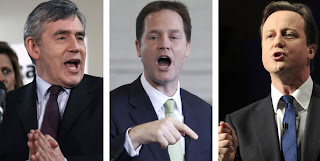LONDON, Wednesday
Britain’s party leaders criss-crossed the country making a final push for votes in the last day of campaigning before Thursday’s parliamentary election, as two polls pointed to an inconclusive result.
One poll indicated that Labour, in power since 1997 but battered by recession and public anger over a scandal over MPs’ expenses that has tainted all the main parties, could still win the greatest number of seats in parliament.
Still undecided
Opposition Conservative leader David Cameron campaigned through the night and Prime Minister Gordon Brown made an early visit on Wednesday morning to market workers in northern England to court the one third of voters said still to be undecided.
A YouGov poll for the Sun newspaper suggested the centre-right Conservatives’ support was unchanged on 35 per cent, while centre-left Labour rose to 30 per cent. The Liberal Democrats, who had enjoyed a strong rise in recent weeks, fell four points to 24 per cent.
A ComRes poll for the Independent newspaper put support for the parties unchanged, with the Conservatives 8 points ahead of Labour, making David Cameron’s party the largest in a 650-seat parliament, but denying him outright control.
Both polls suggest a “hung parliament”, in which the centrist Liberal Democrats could hold the balance of power. Britain has not had an inconclusive election result of this kind since 1974 and is unused to the kind of coalition-building familiar to many European countries.
Two senior Liberal Democrats said they would work constructively with whoever voters decided should lead the country but reiterated that they could not support a party that won the most seats despite coming third in votes.
However, Liberal Democrat leader Nick Clegg dismissed suggestion he could be kingmaker come Friday. “There are 45 million people in this country who are entitled to vote, 45 million kingmakers,” he told supporters.
Northern Ireland’s Democratic Unionist Party, which is expected to win at least nine seats, is willing to enter a formal coalition with the Conservatives if they fail to win an overall majority, the Daily Telegraph newspaper reported.


No comments:
Post a Comment